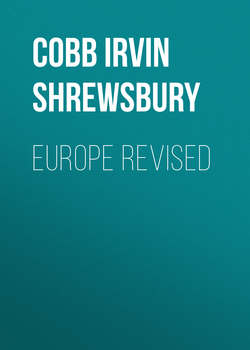Читать книгу Europe Revised - Cobb Irvin Shrewsbury - Страница 5
Chapter V. When the Seven A.M. Tut-tut leaves for Anywhere
ОглавлениеBeing desirous of tendering sundry hints and observations to such of my fellow countrymen as may contemplate trips abroad I shall, with their kindly permission, devote this chapter to setting forth briefly the following principles, which apply generally to railroad travel in the Old World.
First—On the Continent all trains leave at or about seven A.M. and reach their destination at or about eleven P.M. You may be going a long distance or a short one—it makes no difference; you leave at seven and you arrive at eleven. The few exceptions to this rule are of no consequence and do not count.
Second—A trunk is the most costly luxury known to European travel. If I could sell my small, shrinking and flat-chested steamer trunk—original value in New York eighteen dollars and seventy-five cents—for what it cost me over on the other side in registration fees, excess charges, mental wear and tear, freightage, forwarding and warehousing bills, tips, bribes, indulgences, and acts of barratry and piracy, I should be able to laugh in the income tax's face. In this connection I would suggest to the tourist who is traveling with a trunk that he begin his land itinerary in Southern Italy and work northward; thereby, through the gradual shrinkage in weight, he will save much money on his trunk, owing to the pleasing custom among the Italian trainhands of prying it open and making a judicious selection from its contents for personal use and for gifts to friends and relatives.
Third—For the sake of the experience, travel second class once; after that travel first class—and try to forget the experience. With the exception of two or three special-fare, so-called de-luxe trains, first class over there is about what the service was on an accommodation, mixed-freight-and-passenger train in Arkansas immediately following the close of the Civil War.
Fourth—When buying a ticket for anywhere you will receive a cunning little booklet full of detachable leaves, the whole constituting a volume about the size and thickness of one of those portfolios of views that came into popularity with us at the time of the Philadelphia Centennial. Surrender a sheet out of your book on demand of the uniformed official who will come through the train at from five to seven minute intervals. However, he will collect only a sheet every other trip; on the alternate trips he will merely examine your ticket with the air of never having seen it before, and will fold it over, and perforate it with his punching machine and return it to you. By the time you reach your destination nothing will be left but the cover; but do not cast this carelessly aside; retain it until you are filing out of the terminal, when it will be taken up by a haughty voluptuary with whiskers. If you have not got it you cannot escape. You will have to go back and live on the train, which is, indeed, a frightful fate to contemplate.
Fifth—Reach the station half an hour before the train starts and claim your seat; then tip the guard liberally to keep other passengers out of your compartment. He has no intention of doing so, but it is customary for Americans to go through this pleasing formality—and it is expected of them.
Sixth—Tip everybody on the train who wears a uniform. Be not afraid of hurting some one's feelings by offering a tip to the wrong person. There will not be any wrong person. A tip is the one form of insult that anybody in Europe will take.
Seventh—Before entering the train inhale deeply several times. This will be your last chance of getting any fresh air until you reach your destination. For self-defense against the germ life prevailing in the atmosphere of the unventilated compartments, smoke a German cigar. A German cigar keeps off any disease except the cholera; it gives you the cholera.
Eighth—Do not linger on the platform, waiting for the locomotive whistle to blow, or the bell to ring, or somebody to yell "All aboard!" If you do this you will probably keep on lingering until the following morning at seven. As a starting signal the presiding functionary renders a brief solo on a tiny tin trumpet. One puny warning blast from this instrument sets the whole train in motion. It makes you think of Gabriel bringing on the Day of Judgment by tootling on a penny whistle. Another interesting point: The engine does not say Choo-choo as in our country—it says Tut-tut.
Ninth—In England, for convenience in claiming your baggage, change your name to Xenophon or Zymology—there are always about the baggage such crowds of persons who have the commoner initials, such as T for Thompson, J for Jones, and S for Smith. When next I go to England my name will be Zoroaster—Quintus P. Zoroaster.
Tenth—If possible avoid patronizing the so-called refreshment wagons or dining cars, which are expensive and uniformly bad. Live off the country. Remember, the country is living off you.
